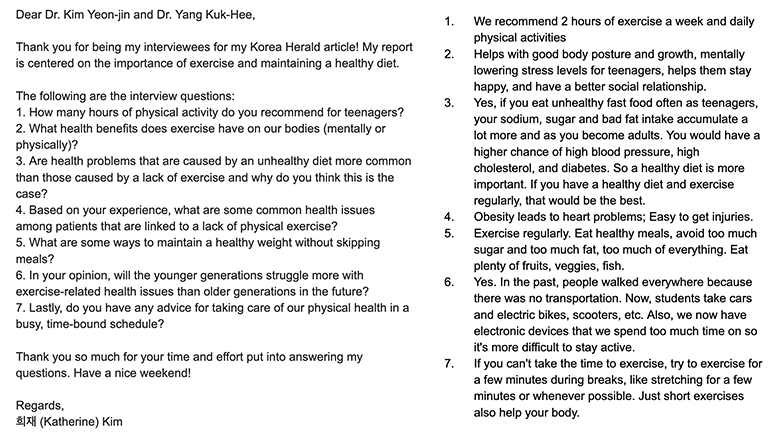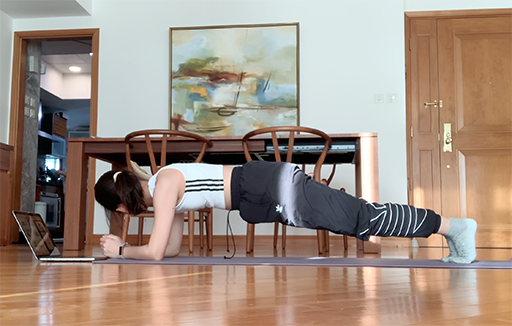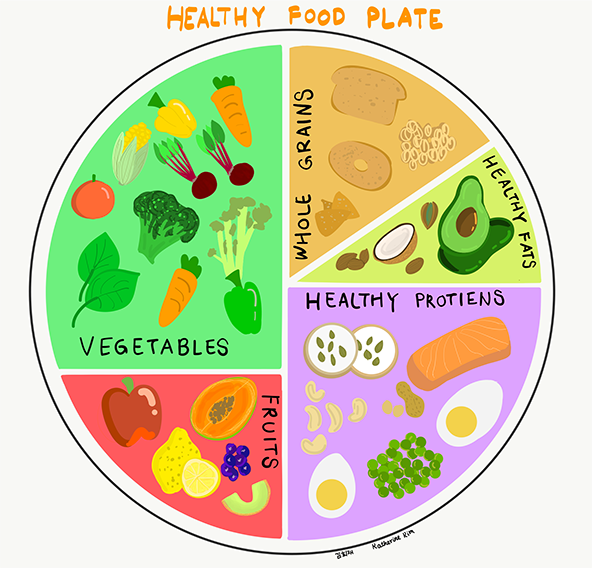Do you ever sit still at your desk for an entire day, only getting up for occasional trips to the kitchen? For most students, this is because of distance learning. During the COVID-19 pandemic, students all over the world have experienced online learning. Believe it or not, many of us are going through the same things: sitting at our desks for hours, slouching over our computers, and seldom getting up from our chairs. For students, this is the new normal. Nonetheless, it can have severe negative health effects.
In a situation where a strong immune system is essential for the safety of ourselves and others, we must nurture our physical and mental health. Although there are few effective ways to maintain our physical well-being, there are certain ways to take action. To get a deeper understanding of this topic, I interviewed two doctors from South Korean hospitals via email and FaceTime. According to anesthesiologist Kim Yeon-jin of the Hamchoon Women’s Clinic and neurosurgeon Yang Kuk-hee of the National Health Insurance Service Ilsan Hospital, the best way to stay healthy is through exercise. It not only invigorates growth, promotes the immune system, and benefits body posture, but it even supports our mental health by promoting body positivity, something teenagers of our generation often struggle with.

Not exercising enough can have negative effects on our bodies. In addition to causing minor inconveniences such as unanticipated acne breakouts, eating unwholesome food is the most common cause of most long-term health problems. Surprisingly, problems caused by an unhealthy diet are more common than those caused by a lack of exercise.
If teens consume unhealthy fast food often, our sodium, sugar, and trans fat intake increases. When we become adults, the fats that have accumulated inside our bodies throughout the years may cause blockages in our blood vessels, leading to high blood pressure or high cholesterol. Although these may seem like minor problems at first, they could lead to serious health problems such as cerebrovascular diseases (diseases affecting blood vessels in the brain), resulting in brain damage due to oxygen deprivation. “You can take medicine to lower your blood pressure,” informed Dr. Yang, “but this doesn’t mean that your blood vessels will be completely clear of unwanted substances. In the case of hypertension, you can take medicine and maintain a healthy diet. On the other hand, since our blood vessels circulate blood throughout our entire body, high cholesterol causes fat accumulation and stops blood flow in some areas. It can cause even more problems, even liver problems.” For example, there are unhealthy substances in fast-food that our bodies cannot get rid of merely through exercise. There are more complicated ways to do so, but they are seemingly painful and expensive procedures that are rarely effective. Nonetheless, if we maintain a healthy diet, unhealthy substances should not accumulate inside our bodies.
Obesity is, in both cases, a common health problem caused by an unhealthy diet over the long term. In most Asian countries, people tend to eat healthier food than those in the West, because most Asian diets consist of vegetables, healthy fiber, and lean proteins that do not contain much fat. In Western countries, however, people tend to eat unhealthily (fast foods, sodas, deep-fried foods, sugary drinks, cakes, butter pastries, et cetera.), so a larger percentage of people suffer from issues such as hypertension, obesity, and diabetes. According to the American health information website Healthline, approximately 36.5% of adults in the U.S. are obese. More than one-third of the adult American population suffers from obesity! On the other hand, the Organization for Economic Co-operation and Development (OECD) states that the obesity rate in South Korea is among the lowest on record, but has slowly been increasing over the years. Strokes, coronary heart disease, and high mortality rates are just a few of the different side effects of obesity.
So, how exactly can we avoid such problems? Both Dr. Kim and Dr. Yang strongly advised maintaining a robust exercise regime. According to Dr. Kim, teenagers should do at least two hours of aerobic exercise every week, including at least 30 minutes of any form of exercise every single day. If we cannot find the time to exercise because of our hectic schedules, we should at least try to squeeze in a few minutes of exercise during the day, replacing a portion of our break times with short workouts. Stretching in between classes, even if it is just for a few minutes, or whenever possible, is also recommended. Believe it or not, simple, 10-minute exercises can significantly impact a person’s body more than we think.

Fortunately, there are several ways to maintain a healthy weight without skipping meals, which is a strategy many teens have tried. To lose weight and keep it off, you have to decrease the number of calories consumed and increase the calories burned through exercise. Nevertheless, consuming fewer calories does not necessarily mean that we are eating less. For instance, some foods like vegetables contain a minimal number of calories but fill our stomachs up quickly, due to the fiber and water they contain. Dr. Kim kindly provided tips for developing an effective diet: “Eat healthily, exercise, and avoid too much sugar and trans fat. We must eat a balanced amount of veggies, nuts, proteins, and preferably fish over red meat. Essentially, avoid eating too much of anything,” Dr. Kim added. Eating fruits and veggies even promote healthy skin.

As stated earlier, South Korea has one of the lowest obesity rates in the world. Although only 4% of the entire South Korean adult population is obese, OECD studies show that obesity rates are predicted to rise by an additional five percent over the next 10 years. Both Dr. Kim and Dr. Yang expressed the opinion that younger generations will undoubtedly tackle exercise-related health issues much more than the older generations. In the past, people would usually travel on foot due to the lack of transportation. Today, however, students take cars, electric scooters and bikes, and Segways. As a result, our most basic means of exercise are fading away. Moreover, we now spend too much time on electronic devices, to the point where it has become a potential health threat. It is now much more difficult to stay physically active. If we want to rein in the rising mortality rates and build a robust immune system that can withstand COVID-19, exercising regularly and eating healthily is the key to developing a healthy society. It is never too late.

Katherine Kim
Grade 8
Hong Kong International School

